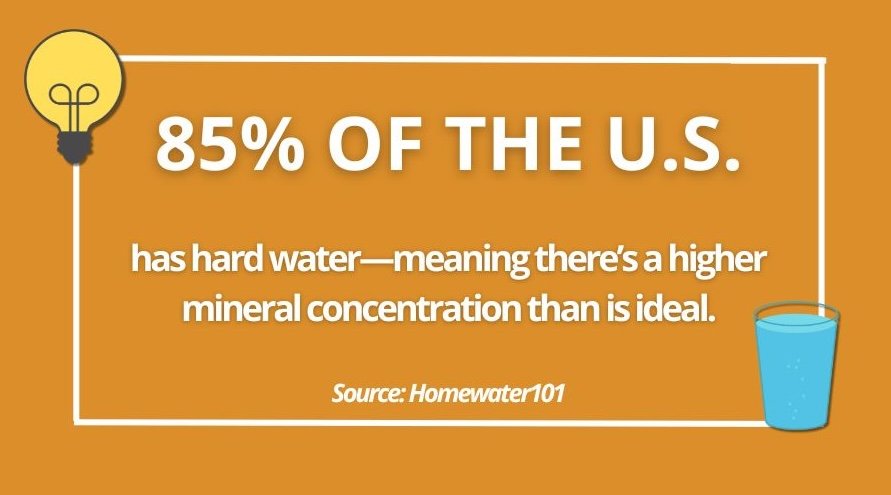How to Tell if You Have Hard Water and Why it Matters
Ever get out of the shower and feel like your skin is dry or sticky, even after rinsing? Or maybe your clean dishes come out of the dishwasher looking cloudy or spotty? You might be dealing with hard water, but you’re not alone. Over 85% of the U.S. has hard water!
In this article, we’ll show you how to tell if you have hard water, why it matters for your home’s plumbing and appliances, and what to do if you spot the signs.
What is Hard Water?
Hard water is water that has a high concentration of minerals mainly calcium and magnesium.
These minerals aren’t dangerous to your health, but they do interact with soap, detergents, and your home’s plumbing systems in ways that can lead to long-term damage.
Hard water usually comes from underground sources where water passes through limestone, chalk, or gypsum, picking up minerals along the way. The hardness level of your water can vary depending on where you live.
You can’t always taste or smell it, but the signs show up in other ways.
Issues Associated With It
At first, hard water might just seem like an annoyance. You may notice more cleaning to do, or your hair may not feel quite right after a shower. But over time, it can cause real, expensive problems:
Scale buildup in pipes: Mineral deposits can narrow pipes, reducing water flow and pressure.
Wear and tear on appliances: Dishwashers, washing machines, and water heaters all work harder—and wear out faster—when scale builds up inside.
Increased energy bills: Just a 1/16-inch layer of scale in your water heater can reduce its efficiency by up to 12%.
Poor soap performance: Hard water makes it harder for soap and shampoo to lather, which means more product and more rinsing.
So while hard water might not be harmful to your health, it’s definitely not harmless to your home.
The Most Common Signs of Hard Water
Spots on dishes or glasses: These are leftover minerals, not poor cleaning.
Soap that won’t lather well: Hard water reacts with soap and reduces its effectiveness.
Dry or itchy skin after bathing: Mineral-heavy water can strip away natural oils.
Dull or frizzy hair: The minerals coat your hair, making it feel rough or limp.
White, chalky buildup on faucets or showerheads: This is scale forming on surfaces.
Low water pressure: Scale buildup inside your pipes can restrict flow.
Faded, stiff laundry: Hard water makes it tough for detergent to fully rinse out.
These signs don’t always appear all at once—but if you’re noticing more than one, it’s time to take a closer look.
How to Check for Hard Water Without a Test Kit
While water test kits are inexpensive and widely available, you don’t need one right away to confirm your suspicions. Here are a few simple checks you can do at home:
The Soap Bottle Test
Fill a clear bottle halfway with cold tap water.
Add 5–10 drops of liquid dish soap.
Shake it for a few seconds.
If you see little to no suds, and the water looks cloudy, that’s a likely sign of hard water.
Check Your Fixtures
Look closely at your faucets, showerheads, or around your sink drains. A white, chalky crust is usually mineral buildup from hard water.
Pay Attention to How Water Feels
Hard water can leave your skin feeling tight or sticky, even after rinsing. Soft water, on the other hand, feels slick or slippery.
These at-home checks aren’t perfect, but they’re often enough to confirm whether hard water is likely.
What Happens If You Ignore Hard Water?
Ignoring hard water might not seem like a big deal at first—but over time, the damage adds up. Here’s what can happen if you let it go:
Appliance breakdowns: Water heaters can fail sooner due to scale on heating elements.
Reduced efficiency: Appliances use more energy and water to do the same job.
Pipe damage: Internal scaling leads to clogs, corrosion, or leaks.
Costly repairs or replacements: You may face early replacement of appliances or plumbing if buildup isn’t addressed.
Over time, hard water isn’t just inconvenient—it’s expensive.
Other Recommended Maintenance
Even if your water isn’t extremely hard, a little regular maintenance goes a long way:
Flush your water heater once a year to remove sediment and scale.
Clean your showerheads and faucets with vinegar to break up mineral deposits.
Inspect plumbing fixtures regularly for early signs of scaling or corrosion.
Use appliance cleaners made to combat hard water buildup in dishwashers and washing machines.
This kind of upkeep not only keeps things working smoothly, but it also gives you a chance to catch problems before they turn into repairs.
When to Call a Professional
Sometimes, the signs of hard water can point to bigger problems that you can’t see on your own. That’s when it’s smart to call a professional—especially if:
Your water heater is running constantly or takes longer to heat
You notice frequent plumbing issues or pressure drops
You’re buying or selling a home and want to check water quality and system condition
You suspect long-term buildup or hidden damage behind walls or in older systems
At Taylor Made Home Inspections, we inspect plumbing systems, fixtures, and water heaters as well as your home's other critical systems.
We know how to spot mineral damage early and help homeowners make informed decisions—whether it’s time for maintenance, repairs, or an upgrade.
Conclusion
If you’ve been wondering how to tell if you have hard water, now you know the signs to look for—and why it’s not something to ignore. From cloudy dishes to clogged pipes, the effects of hard water can sneak up fast.
You don’t have to figure it out alone. A professional inspection can help—schedule yours with Taylor Made Home Inspections today for clear answers about your entire home.


